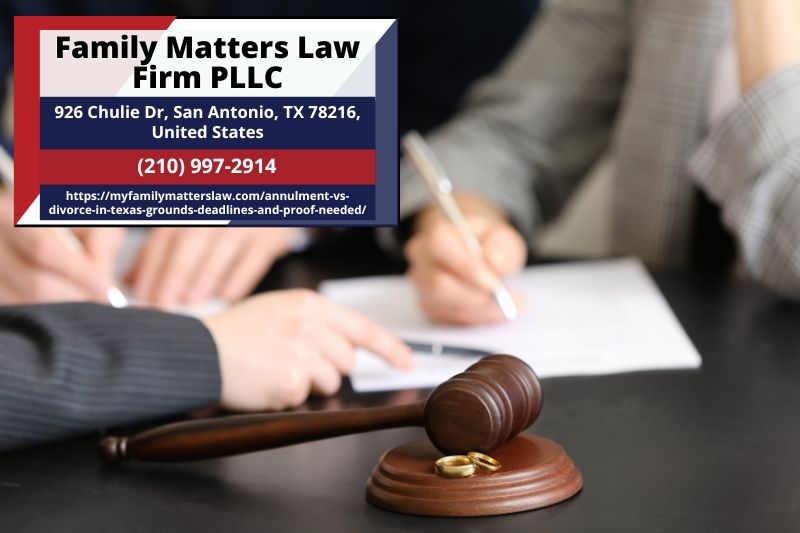Understanding the legal distinctions between annulment and divorce is crucial for anyone facing the end of a marriage in Texas. San Antonio family lawyer Linda Leeser (https://myfamilymatterslaw.com/annulment-vs-divorce-in-texas-grounds-deadlines-and-proof-needed/) of Family Matters Law Firm PLLC provides a comprehensive explanation of the grounds, deadlines, and proof required for each option. For those unsure about which legal path to take, her insights shed light on how each decision can impact finances, parental rights, and long-term stability.
While both annulment and divorce result in the legal termination of a marital relationship, San Antonio family lawyer Linda Leeser emphasizes that the core difference lies in the legal status of the marriage itself. Divorce ends a legally valid marriage, while annulment asserts that a marriage was never legally valid to begin with. “The most fundamental distinction between divorce and annulment comes down to a single question: Was your marriage legally valid from the start?” says Leeser.
According to the San Antonio family lawyer, the state of Texas assumes that all marriages are valid unless there is strong, convincing evidence to prove otherwise. This makes annulment a more difficult legal route. Texas law sets a high bar, requiring the person seeking an annulment to provide solid, admissible evidence. Linda Leeser explains that “a person requesting an annulment is not merely asking to end a relationship; they are asking the court to go against one of the core policies of Texas family law”.
Linda Leeser, who leads Family Matters Law Firm PLLC, further explains that Texas law recognizes two types of invalid marriages: void and voidable. Void marriages, such as those involving close relatives or bigamy, are never considered legally valid. Voidable marriages, on the other hand, are presumed valid until a court annuls them based on specific grounds. These include factors like underage marriage without consent, marriage under the influence of drugs or alcohol, fraud, duress, mental incapacity, concealed divorce, or marrying within 72 hours of obtaining a license.
Leeser emphasizes the urgency of timing in annulment cases. For most grounds, the petitioner must not have continued living with their spouse after discovering the issue. This rule, known as “no voluntary cohabitation,” can make or break an annulment case. “Although some people may want to ‘work things out,’ remaining in the same household can irreversibly harm their claim,” she warns.
By contrast, divorce in Texas is more accessible and common. It applies to valid marriages and allows for both no-fault and fault-based filings. No-fault divorces require no proof of wrongdoing, while fault-based divorces can be filed on grounds such as cruelty, adultery, abandonment, or a felony conviction. These grounds may influence how property is divided by the court, especially in cases where one spouse's actions contributed to the breakdown of the marriage.
Property division represents another critical difference between annulment and divorce. In divorce cases, Texas follows community property rules, dividing assets and debts acquired during the marriage in a manner deemed “just and right.” In annulment cases, since the marriage is treated as if it never legally existed, the court generally restores each party to their pre-marriage financial status. This can result in harsher financial consequences for one party, particularly when it comes to shared debt that was incurred under one spouse’s name.
Child custody and support matters remain consistent across both annulment and divorce proceedings. Texas law ensures that children born or adopted during an annulled marriage are considered legitimate and entitled to the same legal protections as children from a divorced marriage. In both situations, a separate Suit Affecting the Parent-Child Relationship (SAPCR) must be filed to determine custody, visitation, and support.
San Antonio family lawyer Linda Leeser also draws attention to long-term financial considerations, such as inheritance rights and eligibility for Social Security benefits. Divorce may allow for spousal or survivor benefits if the marriage lasted at least 10 years. Annulment, however, completely severs any eligibility because the marriage is treated as if it never legally existed. For couples in long-term relationships considering annulment, this can significantly impact retirement planning and financial security.
Choosing between annulment and divorce is more than a procedural decision—it has lasting consequences for all parties involved. According to Leeser, the process demands timely action and an informed understanding of Texas law. “Understanding the legal grounds, meeting strict deadlines, and providing the right proof are essential steps in protecting your rights,” she advises.
Linda Leeser’s path to becoming a San Antonio family lawyer was shaped by her own experience fighting for conservatorship of her grandchild. After initially being represented by another attorney, Leeser took over her own case, which inspired her to pursue law. She earned her Doctorate of Jurisprudence from St. Mary’s School of Law and is now licensed to practice in Texas and the U.S. District Court for the Western District of Texas. Her legal career includes a wide range of family law matters, and she serves on the board of the Family Law Bar Association - San Antonio.
For those facing a critical decision about ending a marriage, Linda Leeser and her team at Family Matters Law Firm PLLC offer clear guidance to help clients choose the legal path that best aligns with their goals. Her message is clear: acting quickly and understanding the implications of each option are vital to protecting one’s future.
About Family Matters Law Firm PLLC:
Family Matters Law Firm PLLC is based in San Antonio, Texas, and focuses on legal matters that impact families. Led by Linda Leeser, the firm is dedicated to helping clients navigate the legal system with clarity and compassion. From child custody and support to complex divorce and annulment cases, the firm aims to support individuals during life’s most challenging transitions.
Embeds:
Youtube Video: https://www.youtube.com/watch?v=tpfFQA27Xio
GMB: https://www.google.com/maps?cid=1486853059394308163
Email and website
Email: schedule@attytx.com
Website: https://myfamilymatterslaw.com/
Media Contact
Company Name: Family Matters Law Firm PLLC
Contact Person: Linda Leeser
Email:Send Email
Phone: (210) 997-2914
Address:926 Chulie Dr
City: San Antonio
State: Texas 78216
Country: United States
Website: https://myfamilymatterslaw.com/

